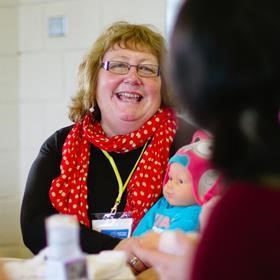‘You show them that you care, that it is their story to tell and that you are here to listen to it’
This International Nurses Day, we asked family nurses what their job means to them; why they became family nurses, what they have learnt and why they love doing what they do.
‘Becoming a family nurse has been a career and life changing experience. I have developed skills, patience and a calmness in the face of trauma - I am now able to truly work in partnership with my clients.’ A. Bucknall - family nurse.
Since 2007 in England, family nurses have been working with vulnerable first time young mothers, building relationships and supporting them to make positive decisions to support the health and development of their babies, and to make good choices about their own lives. For many young women, this unique partnership with their family nurse brings a consistency and a positive role model that they may not have experienced before.
The Family Nurse Partnership (FNP) programme, promotes positive change, respectful challenge and focuses on building a therapeutic relationship with clients, based on three theories; the Human Ecology theory, the Attachment theory and the Self-efficacy theory.
‘Family nurses facilitate changes that can have lifelong impact for individuals, families and the wider community. The theoretical basis and methods of working enable commonly held misconceptions to be challenged, potential to be fulfilled and babies to have a secure start in life’ – Sarah Tyndall, FNP national unit clinical quality lead and former family nurse supervisor.
As part of their role, all family nurses receive reflective, restorative supervision from their family nurse supervisor. Meeting regularly for supervision sessions provides them with the space to reflect on and analyse their work with clients and to make robust plans to ensure that the needs of the baby remain paramount. Supervision also supports family nurses to consider how their feelings might influence decision-making around clients, helping to avoid ‘early evidence bias’;it’s often human nature to accept initial thoughts concerning a situation but supervision can prevent this. Supervisors support family nurses to consider how their feelings could possibly influence decisions. Much evidence is placed on practitioners becoming subjective when they have strong relationships with mums, and a key aspect of an FNP supervisor’s role is to be able to challenge this.
Family nurses use specific approaches derived from the world of motivational interviewing, focusing on enhancing a young parent’s motivation to change. Family nurses listen, guide and advise using these skills to support parents to make positive changes for themselves and their baby.
‘We do not dismiss the girl’s traumas by trying to fix them ourselves. Instead we use our skills to help them build on themselves and their babies to a point where they can create a better life. It’s a true privilege that we get to hear their stories’ - A.Bucknall, family nurse
Family nurses are the heartbeat of the FNP programme; their determination, passion and professionalism have enabled FNP to reach over 35,000 families in England.
‘I have been a family nurse for 5 years and can’t imagine another job that I would prefer; I really enjoy being alongside the families during such an important time in their lives and love having the opportunity to make a real difference to their outcomes. Some of the families we support are among the most disadvantaged and very often, their motivation for change, determination to provide the best for their children and their resilience is humbling’- R.Black – family nurse
The support, learning and continued development family nurses receive stems from guidance and best practice, developed and formulated by the clinical team at the Family Nurse Partnership National Unit, all of whom started their journeys as supervisors and family nurses - joining the National Unit to help deliver the best possible support for family nurses across England.
‘I joined FNP because of the ways in which clinicians are supported to work with clients, to raise self-efficacy, to support them to realise their potential and to be the very best parents they can be – this is something I feel so passionate about. The way FNP supports nurses to work with clients makes sense to me and when I joined the programme, I felt I had connected with ‘like-minded’ people who shared a common vision. I joined the Family Nurse Partnership National Unit as I wanted to share my passion for this work.’ Emma Cook - FNP National Unit clinical quality lead and former family nurse.
FNP is an evidence-based programme, which we continue to develop, improve and adapt to achieve the best possible outcomes for clients. The mix of high quality nursing practice, long-term relationships, listening and building on strengths, following evidence, being curious, asking questions and embracing change continues to create a powerful programme, producing many strong partnerships and outcomes that allow us to show the impact that early intervention can have.
More information on family nurses and supervisors can be found here.
In this short clip we hear from an FNP client on how her family nurse has helped her to work through her anxiety and mental health issues.
